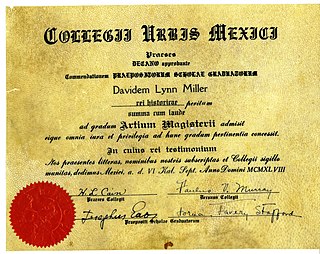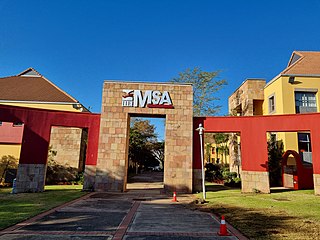
Postgraduate education, graduate education, or graduate school consists of academic or professional degrees, certificates, diplomas, or other qualifications usually pursued by post-secondary students who have earned an undergraduate (bachelor's) degree.
A bachelor's degree or baccalaureate is an undergraduate degree awarded by colleges and universities upon completion of a course of study lasting three to six years. The two most common bachelor's degrees are the Bachelor of Arts (BA) and the Bachelor of Science. In some institutions and educational systems, certain bachelor's degrees can only be taken as graduate or postgraduate educations after a first degree has been completed, although more commonly the successful completion of a bachelor's degree is a prerequisite for further courses such as a master's or a doctorate.

Undergraduate education is education conducted after secondary education and before postgraduate education, usually in a college or university. It typically includes all postsecondary programs up to the level of a bachelor's degree. For example, in the United States, a student pursuing an associate or bachelor's degree is known as an undergraduate student while a student pursuing a master's or doctoral degree is a graduate student. Upon completion of courses and other requirements of an undergraduate program, the student would earn the corresponding degree. In some other educational systems, undergraduate education is postsecondary education up to and including the level of a master's degree; this is the case for some science courses in Britain and some medicine courses in Europe.
Bachelor of Civil Law is the name of various degrees in law conferred by English-language universities. The BCL originated as a postgraduate degree in the universities of Oxford and Cambridge; at Oxford, the BCL continues to be the primary postgraduate taught course in law. It is also taught as an undergraduate degree in other countries. The reference to civil law was not originally in contradistinction to common law, but to canon law, although common law was not taught in the civil law faculties in either university until at least the second half of the 18th century. However, some universities in English-speaking countries use the degree in the former sense.
A Bachelor of Commerce is an undergraduate degree in business, management, economics or accounting, awarded in Canada, Australia, India, Bangladesh, Sri Lanka, Pakistan, Ireland, New Zealand, Ghana, South Africa, Myanmar, Egypt, and additional Commonwealth countries.
A Bachelor of Laws is an undergraduate law degree offered in most common law countries as the primary law degree and serves as the first professional qualification for legal practitioners. This degree requires the study of core legal subjects and jurisprudence to provide a comprehensive understanding of the legal system and its function. The LLB curriculum is designed to impart a thorough knowledge of legal principles, legal research skills, and a sound understanding of the roles and responsibilities of lawyers within society. This degree is often a prerequisite for taking bar exams or qualifying as a practising lawyer, depending on the jurisdiction. Additionally, the LLB program also serves as a foundation for further legal education, such as a Master of Laws (LLM) or other postgraduate studies in law.

A diploma is a document awarded by an educational institution testifying the recipient has graduated by successfully completing their courses of studies. Historically, it has also referred to a charter or official document of diplomacy.
A Master of Laws is an advanced postgraduate academic degree, pursued by those either holding an undergraduate academic law degree, a professional law degree, or an undergraduate degree in a related subject. In most jurisdictions, the LL.M. is the advanced professional degree for those usually already admitted into legal practice.
A graduate diploma is generally a qualification taken after completion of a first degree, although the level of study varies in different countries from being at the same level as the final year of a bachelor's degree to being at a level between a master's degree and a doctorate. In some countries the graduate diploma and postgraduate diploma are synonymous, while in others the postgraduate diploma is a higher qualification.

A postgraduate diploma is a postgraduate qualification at the level of a master's degree, awarded after a university degree, which supplements the original degree and awards them with a graduate diploma. The minimum requirement of completing a Bachelor's degree is necessary to start the Postgraduate course. The duration of a Postgraduate course can vary from 1 year to 2 years.
A Doctor of Pharmacy is a professional doctorate in pharmacy. In some countries, it is a proficient graduate degree to practice the profession of pharmacy or to become a clinical pharmacist. In many countries, people with their Doctor of Pharmacy are allowed to practice independently and can prescribe drugs directly to patients. A PharmD program has significant experiential and/or clinical education components in introductory and advanced levels for the safe and effective use of drugs. Experiential education prepares graduates to be practice-ready, as they already have spent a significant amount of time training in areas of direct patient care and research.
In Western universities, a Bachelor of Divinity or Baccalaureate in Divinity is a postgraduate academic degree awarded for a course taken in the study of divinity or related disciplines, such as theology or, rarely, religious studies.
Honours degree has various meanings in the context of different degrees and education systems. Most commonly it refers to a variant of the undergraduate bachelor's degree containing a larger volume of material or a higher standard of study, or both, rather than an "ordinary", "general" or "pass" bachelor's degree. Honours degrees are sometimes indicated by "Hons" after the degree abbreviation, with various punctuation according to local custom, e.g. "BA (Hons)", "B.A., Hons", etc. In Canada, honours degrees may be indicated with an "H" preceding the degree abbreviation, e.g. "HBA" for Honours Bachelor of Arts or Honours Business Administration.

The IIE MSA, formerly known as Monash South Africa, is a university located in Johannesburg, Gauteng, South Africa. The Managing Director at IIE MSA is currently Louise Wiseman.
A Bachelor of Pharmacy is a graduate academic degree in the field of pharmacy. In many countries, this degree is a prerequisite for registration to practice as a pharmacist. Since both PharmB and PharmD are prerequisites to license in most Western countries they are considered equivalent. In many Western countries, foreign graduates with BPharm, PharmB, or BS Pharm practice similarly to PharmD graduates. It is analogous to an MBBS vs. an MD, where MBBS is the foreign equivalent of MD. The degree provides training to understand the properties and impacts of medicines and develop the skills required to counsel patients about their use.

The Regent University College of Science and Technology is located in Accra, Ghana. It was registered in September 2003, and received accreditation to operate as a tertiary institution in 2004. In January 2005 it started its lectures with 30 pioneer students at Trinity Campus, Mataheko.

A Bachelor of Science is a bachelor's degree that is awarded for programs that generally last three to five years.

The University of Professional Studies, Accra (UPSA) formerly known as the Institute of Professional Studies (IPS), is a public university in Ghana. The main campus is located in Accra. UPSA is the first university in Ghana to provide both academic and business professional education. The University of Professional Studies Act, 2012 (Act 850) changed the name of the Institute of Professional Studies to University of Professional Studies, Accra. UPSA is nationally and internationally accredited by the National Accreditation Board (Ghana) and the Accreditation Council for Business Schools and Programs (ACBSP), respectively.

The University of Ruhuna has ten faculties: Agriculture, Engineering, Fisheries and Marine Sciences & Technology, Humanities and Social Sciences, Management and Finance, Medicine, Science, Graduate studies, Technology and Allied Health Sciences.









